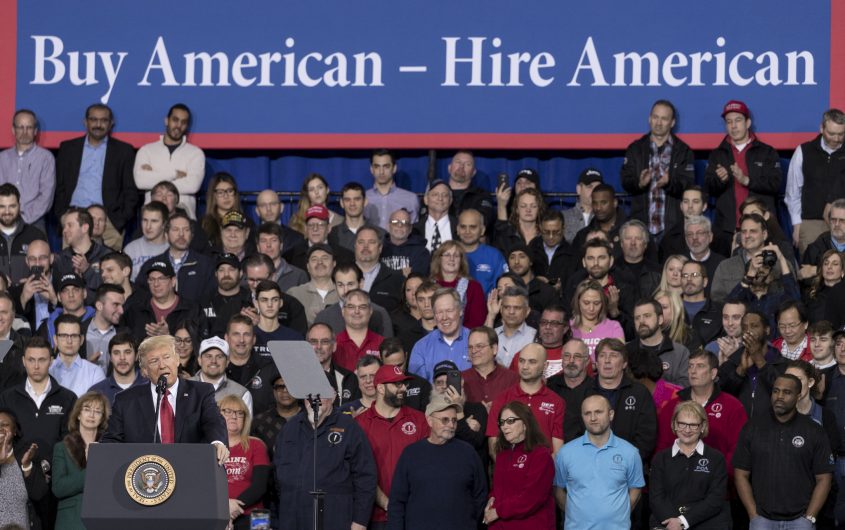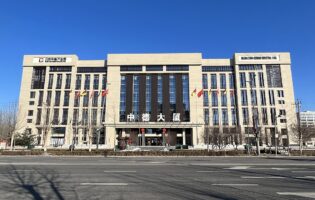
Official White House Photo by Shealah Craighead
Protectionism Is the Wrong Medicine

Galina Kolev
German Economic Institute
Galina Kolev was an American-German Situation Room Fellow in July 2018.
Galina Kolev is senior economist and head of research group Macroeconomic Analysis and Forecast at the German Economic Institute (IW) in Cologne, Germany. She hold a PhD (German Dr. rer. Pol.) in Economics from the University of Mannheim with focus on issues regarding the European economic and monetary integration. Her current research covers a broad range of topics from the field of international economics, especially International Macroeconomics and Trade Policy. She is lecturer at the Cologne University of Applied Sciences and the Fresenius University of Applied Sciences, where she teaches Macroeconomics and International Economic Affairs.
During her time in Washington, Galina Kolev will focus her research on the development of bilateral trade relations between the U.S. and the EU with focus on the U.S.-German trade. It is of particular interest to investigate the reasons for the trade deficit of the U.S. vis-à-vis Germany as a conflict point motivating recent U.S. trade policy measures. Furthermore, the research is intended to extend the view to the field of trade in services as an important component of the current account.
The principles of a liberal economic and social order have assured increasing wealth and living standards in the last decades and globalization has been one of the main driving engines of this process. It has enabled economies to specialize in a way described more than 200 years ago by economists like David Ricardo, thus benefitting society as a whole, but also creating challenges to those whose jobs were replaced by imports. Many of these employees suffering the consequences of globalization found new opportunities—working in another more prosperous industry or in another geographical region. Some of them have, however, lagged behind for decades.
There is no doubt, though, that globalization has created net benefits to participating economies. Plenty of economic studies investigated the effect of free trade and investment on economic performance and show that the linkage is unmistakably positive. The U.S. as a whole has benefitted from globalization, global value chains, competition, and global investment in particular. Almost a quarter of global inward FDI was directed to the U.S. and even more international capital has flown into U.S. public debt, financing infrastructure and other public projects. Therefore, the problem is not globalization, and a solution to the problem cannot be achieved by destroying the global economic order. Neither is deindustrialization a real problem since the development of a competitive services sector has created new opportunities and additional incomes and jobs that overcompensate for the losses in manufacturing.
The problem is not globalization, and a solution to the problem cannot be achieved by destroying the global economic order.
The real problem is that gains from globalization and tertiarization were not spread among U.S. society. The U.S. has developed from the country of the American Dream to a country of uneven chances. There are only three OECD countries where disposable income after taxes is less equally distributed than in the U.S.: Mexico, Chile, and Turkey. Data provided by Raj Chetty and colleagues shows that intergenerational income mobility has shrunk dramatically since the 1940s in the U.S. More than 90 percent of children born in the 1940s earned more than their parents; in the 1980s cohort that number dropped to just above 50 percent. The U.S. was one of the first OECD countries to introduce a minimum wage. However, since 1960 the minimum wage dropped by more than 10 percent in real terms while real GDP per capita increased by more than 210 percent since then. Today, the U.S. has the lowest ratio of minimum wage to median wages of full time workers among the OECD countries.
Income inequality can indeed be a good means to promote economic growth. It creates incentives for innovation and entrepreneurship and thus boosts economic activity. Furthermore, high income households have higher marginal propensity to save, so inequality increases savings and thus investment. However, inequality can also harm economic growth if it exceeds certain levels since it leads to social unrest, limits the ability to invest in human capital, and shifts preferences of voters toward redistributive policies. Economic research shows that inequality in the U.S. as a whole has long exceeded the threshold above which increasing inequality becomes harmful for economic growth.
It is not too late to address these problems. However, the current political course is far from being adequate to tackle excessive inequality and to spread the benefits of globalization among U.S. citizens. Instead of creating trade barriers and increasing tax benefits for high incomes at the cost of future generations, the administration should think about ways to give a new chance to the unemployed from shrinking manufacturing industries via education and further vocational training. Sometimes it is a matter of time to climb the social ladder; therefore, it is important to increase intergenerational educational and income mobility in order to make it possible at least for the next generation of trade-affected steel and other manufacturing workers to participate in the economic success of the country. Investment in subsidized childcare and good quality public education as well as incentives for employers to fill open positions with workers from trade-affected industries are only two possible ways to make globalization work for all U.S. citizens—not for only a few.
Instead of creating trade barriers and increasing tax benefits for high incomes at the cost of future generations, the administration should think about ways to give a new chance to the unemployed from shrinking manufacturing industries via education and further vocational training.
Closing the borders and reintroducing trade barriers are therefore the wrong medicine, since globalization and free trade are not the disease the U.S. has been suffering from. Applying these policy measures will not only fail to tackle the current severe problems in U.S. society; it will also aggravate the consequences of those problems. If Donald Trump is going to destroy the opportunities, jobs, and incomes globalization has brought to the U.S., then the few steel workers benefitting from 25 percent tariffs on steel imports will have to face unemployment again in the medium term since the U.S. automotive industry will lose competitiveness and demand for U.S. steel will shrink again.
It is not the only disastrous development to be expected as a result of the new course in U.S. trade policy. Defending tariffs on steel and aluminum with national security reasons is also a dangerous game, especially as the relationship between local production and use of steel amounts to more than 80 percent in the U.S. Local production is more than sufficient to meet the needs of national security. Yes, capacity utilization is not at 100 percent, but is steel the product the U.S. would like to specialize in? What about technology, research and development, and other business services? It is hard to imagine that current steel production in the U.S. cannot serve the purpose of national security. Or should the rest of the world perceive this step as an indicator that the U.S. has been expecting or even preparing for new severe challenges to national security that will make it necessary to multiply the amount of steel needed for defense? In any case, using the national security argument is the U.S.’ prerogative; however, it opens the door for all other countries to do the same. The U.S. can only lose this battle and the real problems of U.S. society remain unsolved.









